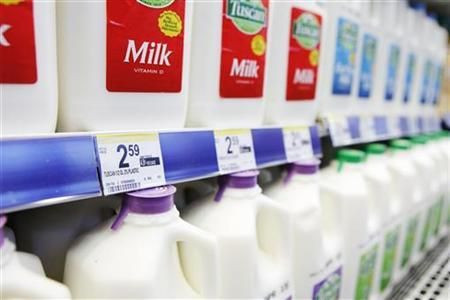New Zealand Dollar Drops To Five-Week Low Amid Baby Formula Scare

New Zealand dairy producers are bracing for the impact of the recent infant formula scare. A threat to poison milk powder from New Zealand has led to a sharp decline in demand from China, the country’s biggest dairy customer, and a drop in the value of the local currency.
Michael Barnett, chairman of the New Zealand Infant Formula Exporters Association, warned that several small companies selling milk in China had reported drops in orders. The exporter group said its distribution network reduced milk orders to as much as 70 percent.
The latest milk scare has caused the New Zealand dollar to drop to its five-week low. Dairy producers have grown increasingly concerned that New Zealand’s biggest export market might look elsewhere. Chinese authorities had declared that it would increase scrutiny of milk imports coming from New Zealand.
Dairy products make up a major part of New Zealand’s total exports. China has driven the demand for New Zealand dairy. It placed NZ$4.1 billion worth of milk exports in 2014, making it almost a third of the global dairy exports for that year, Deutsche Welle reports.
New Zealand police has recently announced that it will launch an investigation into the threat of a suspected environmental activist to contaminate baby formula from the country with 1080 poison. In November, the anonymous individual sent letters containing small packages of baby formula to the National Farmers Federation and Fonterra, the largest dairy producer.
The suspect had threatened to poison the baby formula with agricultural pesticide in retaliation for New Zealand’s use of toxin for pest control. New Zealand Prime Minister John Key called the baby formula scare as a “form of eco-terrorism without doubt.”
In an effort to reduce the economic impact of the baby formula scare, New Zealand’s Ministry for Primary Industries declared there were no signs of poisonous substances in the dairy supply chain. The MPI gave assurances that it has been in close contact with New Zealand’s international customers and regulators in the last three to four weeks.
The New Zealand dollar dropped to 72.50 U.S. cents in afternoon trading of Mar. 12. Later in the day, the New Zealand dollar was pushed further down to 72.27 U.S. cents, reports the New Zealand Herald. Sam Tuck, ANZ senior foreign exchange strategist, said the bank does not think there will be a long-term effect to the New Zealand dollar but the risks remain on the “downside.”
To report problems or leave feedback on this article, contact: r.su@ibtimes.com.au




















